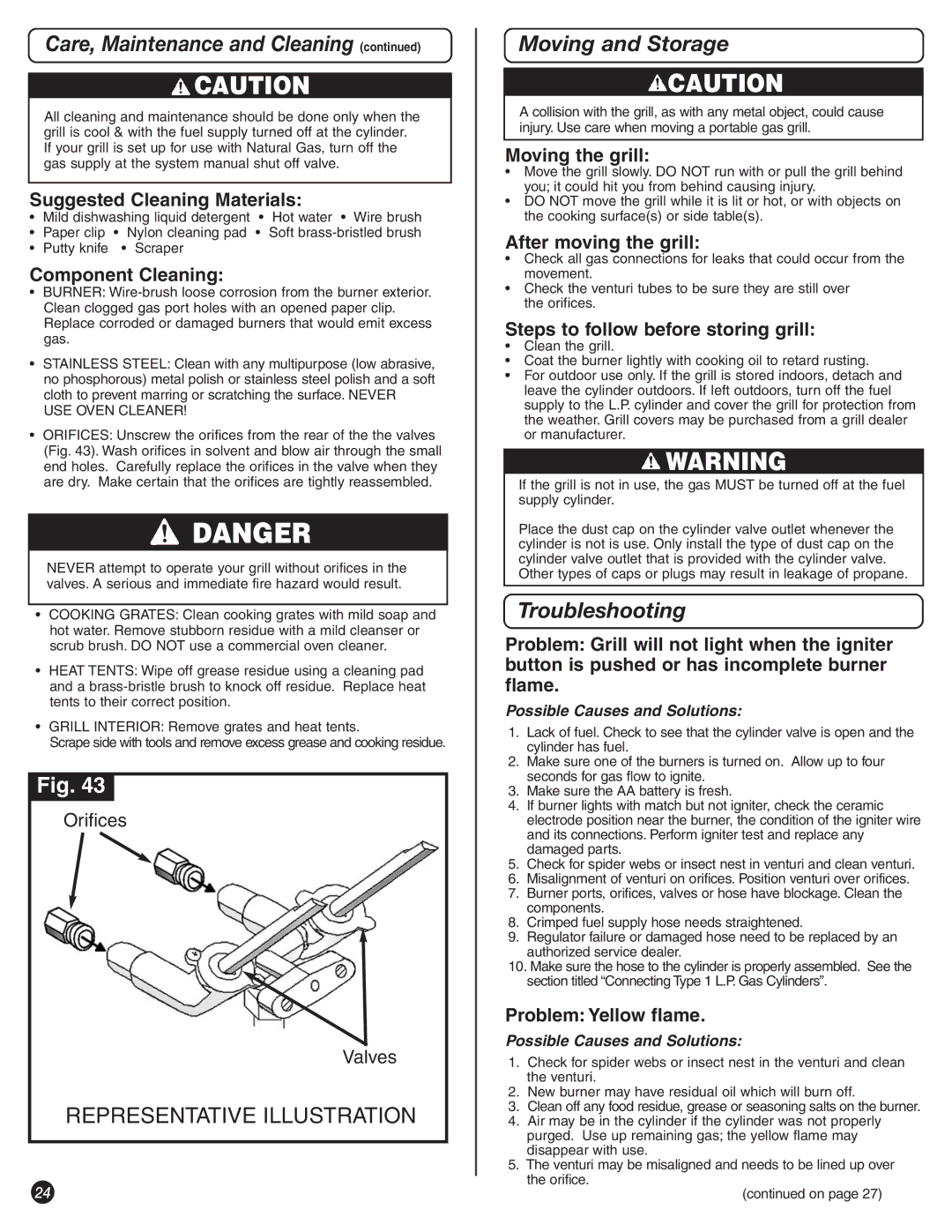
Care, Maintenance and Cleaning (continued)
![]() CAUTION
CAUTION
All cleaning and maintenance should be done only when the grill is cool & with the fuel supply turned off at the cylinder. If your grill is set up for use with Natural Gas, turn off the gas supply at the system manual shut off valve.
Suggested Cleaning Materials:
• | Mild dishwashing liquid detergent | • | Hot water • Wire brush | ||
• | Paper clip | • | Nylon cleaning pad | • | Soft |
• | Putty knife | • | Scraper |
|
|
Component Cleaning:
•BURNER:
•STAINLESS STEEL: Clean with any multipurpose (low abrasive, no phosphorous) metal polish or stainless steel polish and a soft cloth to prevent marring or scratching the surface. NEVER USE OVEN CLEANER!
•ORIFICES: Unscrew the orifices from the rear of the the valves (Fig. 43). Wash orifices in solvent and blow air through the small end holes. Carefully replace the orifices in the valve when they are dry. Make certain that the orifices are tightly reassembled.
![]() DANGER
DANGER
NEVER attempt to operate your grill without orifices in the valves. A serious and immediate fire hazard would result.
•COOKING GRATES: Clean cooking grates with mild soap and hot water. Remove stubborn residue with a mild cleanser or scrub brush. DO NOT use a commercial oven cleaner.
•HEAT TENTS: Wipe off grease residue using a cleaning pad and a
•GRILL INTERIOR: Remove grates and heat tents.
Scrape side with tools and remove excess grease and cooking residue.
Fig. 43
Orifices
Valves
REPRESENTATIVE ILLUSTRATION
24
Moving and Storage
![]() CAUTION
CAUTION
A collision with the grill, as with any metal object, could cause injury. Use care when moving a portable gas grill.
Moving the grill:
•Move the grill slowly. DO NOT run with or pull the grill behind you; it could hit you from behind causing injury.
•DO NOT move the grill while it is lit or hot, or with objects on the cooking surface(s) or side table(s).
After moving the grill:
•Check all gas connections for leaks that could occur from the movement.
•Check the venturi tubes to be sure they are still over the orifices.
Steps to follow before storing grill:
•Clean the grill.
•Coat the burner lightly with cooking oil to retard rusting.
•For outdoor use only. If the grill is stored indoors, detach and leave the cylinder outdoors. If left outdoors, turn off the fuel supply to the L.P. cylinder and cover the grill for protection from the weather. Grill covers may be purchased from a grill dealer or manufacturer.
![]() WARNING
WARNING
If the grill is not in use, the gas MUST be turned off at the fuel supply cylinder.
Place the dust cap on the cylinder valve outlet whenever the cylinder is not is use. Only install the type of dust cap on the cylinder valve outlet that is provided with the cylinder valve.
Other types of caps or plugs may result in leakage of propane.
Troubleshooting
Problem: Grill will not light when the igniter button is pushed or has incomplete burner flame.
Possible Causes and Solutions:
1.Lack of fuel. Check to see that the cylinder valve is open and the cylinder has fuel.
2.Make sure one of the burners is turned on. Allow up to four seconds for gas flow to ignite.
3.Make sure the AA battery is fresh.
4.If burner lights with match but not igniter, check the ceramic electrode position near the burner, the condition of the igniter wire and its connections. Perform igniter test and replace any damaged parts.
5.Check for spider webs or insect nest in venturi and clean venturi.
6.Misalignment of venturi on orifices. Position venturi over orifices.
7.Burner ports, orifices, valves or hose have blockage. Clean the components.
8.Crimped fuel supply hose needs straightened.
9.Regulator failure or damaged hose need to be replaced by an authorized service dealer.
10.Make sure the hose to the cylinder is properly assembled. See the section titled “Connecting Type 1 L.P. Gas Cylinders”.
Problem: Yellow flame.
Possible Causes and Solutions:
1.Check for spider webs or insect nest in the venturi and clean the venturi.
2.New burner may have residual oil which will burn off.
3.Clean off any food residue, grease or seasoning salts on the burner.
4.Air may be in the cylinder if the cylinder was not properly purged. Use up remaining gas; the yellow flame may disappear with use.
5.The venturi may be misaligned and needs to be lined up over the orifice.
(continued on page 27)
